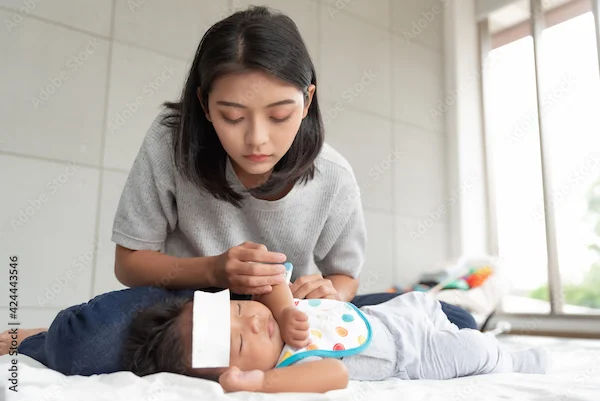How to Reduce Fever in Baby Naturally?
Learn safe and natural ways to reduce fever in babies. Discover home remedies, hydration tips, and soothing methods to keep your little one comfortable and promote recovery.

Written by Dr.Sonia Bhatt
Last updated on 3rd Jul, 2025

Fever refers to an increase in body temperature, typically considered to be 100.4°F (38°C) or higher. Body temperature can vary throughout the day, generally being lowest in the morning. A fever often indicates that the body is combating infections, whether caused by viruses or bacteria. It can also result from overheating, or severe sunburn.
In infants, fevers can stem from several sources, including:
Viral infections (like colds)
Bacterial infections (such as ear infections)
Vaccinations
Other medical issues
Most fevers are self-limiting and will resolve without treatment, but it’s important to keep an eye on your child’s condition. If a fever persists for more than 48 hours or if your child exhibits additional worrying symptoms, consulting a healthcare professional is advisable. Generally, if the fever is short-lived and your child seems otherwise healthy, there is usually no need for concern.
When to worry About a Baby’s Fever?
Children often experience fevers more frequently and at higher temperatures than adults due to their developing immune systems. They may produce pyrogens in response to new infections, while adults typically have built-up immunity. The age of the baby is crucial when assessing the seriousness of a fever. Infants under six months should be monitored closely, as they do not tolerate high temperatures well.
Common indicators of a fever in a baby include:
Hot, dry skin
Decreased appetite
Lethargy
Paleness
Glassy eyes
Excessive crying
It's important to be cautious if a fever is accompanied by concerning signs, such as:
Vomiting
Refusal to eat
Stiff neck
Increased tiredness
Breathing difficulties
Consult Top Paediatrician
Natural Methods to Reduce Fever
When your child has a fever, it’s important to take steps to help them feel more comfortable and support their recovery. Here are some natural methods to manage a fever effectively:
1.Hydration: Make sure your child consumes plenty of fluids.
Avoid giving fruit juice to infants.
Infants should drink breast milk or formula.
If your child is vomiting, an electrolyte solution can be helpful.
2.Diet: it's fine for children to eat during a fever, but don’t pressure them.
They often do better with bland foods, such as:
Breads, crackers, and pasta made from refined white flour.
Hot cereals like porridge or cream of wheat.
3.Clothing: Dress your baby in light clothing and use only a thin blanket.
Overdressing can prevent the body from cooling down naturally.
Avoid wrapping them too tightly, even if they seem cold.
4.Room Temperature: Maintain a comfortable environment, not too hot or too cold.
A fan can help if the room feels stuffy.
5.Watch for Dehydration: High fevers can lead to dehydration, which increases the risk of complications.
Babies are especially vulnerable, so keeping them hydrated is crucial.
For infants under six months, continue breastfeeding. For those over six months, introduce water and electrolyte-rich drinks (such as coconut water or homemade solutions using juice and essential minerals).
Home Remedies for Managing Fever
A fever doesn't always need to be brought back to normal; most children feel better with even a slight decrease in temperature. Here are some effective home remedies to help manage a fever:
1.Lukewarm Baths: A lukewarm bath or sponge bath can assist in cooling your child's fever.
These baths work best when paired with medication; otherwise, the fever may quickly rise again.
Steer clear of cold baths, ice, or alcohol rubs, as these can induce shivering and potentially worsen the situation.
2.Sponging: Use a sponge to gently wipe your baby with lukewarm water.
The water should feel warm but not hot when tested on your inner arm.
Always supervise your child during the bath for safety.
3.Post-Bath Care: After the bath, dry your baby immediately and dress them in light clothing.
Avoid using cold water, as this can cause shivering, which may lead to an increase in temperature.
4.Avoid Alcohol: Alcohol baths or wipes are not advisable for reducing fevers, as they can be harmful.
Role of Diet in Managing Fever
When a child has a fever, providing easily digestible foods that help maintain hydration is essential. Here are some suitable options for children during this time:
Fluids: Encourage your child to drink plenty of fluids to stay hydrated. Options include water, clear broths, herbal teas, and diluted fruit juices. Electrolyte solutions like ORS can also help restore lost fluids and minerals.
Soups: Warm, clear soups, such as chicken noodle or vegetable broth, can be soothing and nourishing while aiding hydration.
Fresh Fruits: Soft, juicy fruits like watermelon, oranges, grapes, and berries are not only hydrating but also packed with vitamins and minerals. Avoid acidic fruits if they worsen throat discomfort.
Yoghurt: Plain, low-fat yoghurt is easy to digest and offers probiotics that benefit gut health. It’s advisable to steer clear of flavoured or sugary types.
Porridge: Warm, easily digestible foods like porridge provide energy and nutrients. You can make it with milk or water and add a little honey for sweetness.
Soft-Cooked Vegetables: Steamed or boiled vegetables, such as carrots or green beans, can be mashed or cut into small, manageable pieces for children with a reduced appetite.
Always consult a healthcare professional for specific dietary recommendations tailored to your child’s age, condition, and any underlying health issues. If your child shows a decreased appetite or severe symptoms, seek medical advice to ensure they receive the appropriate care.
Tips for Comforting a Feverish Baby
When your baby has a fever, simple remedies and plenty of affection can make them feel more at ease—and give you some much-needed rest! A fever can cause discomfort that makes it hard for your baby to sleep. Here are some strategies to help:
Use a Humidifier: A humidifier or cool-mist vapouriser can add moisture to the air in their room, helping to keep nasal passages moist and reducing coughing and congestion during the night. Remember to clean the device regularly to avoid mould growth.
Elevate Your Baby's Head: Lying flat can increase discomfort, so try elevating the head of the cot by a few inches. You can achieve this by placing books under the legs or rolling up a towel to support the mattress.
Consult Your Doctor: Speak with your healthcare provider about using paracetamol or ibuprofen to help reduce fever. They can advise on the appropriate dosage, particularly for children under two. Ibuprofen should be avoided for infants under six months.
Avoid Cough and Cold Medicines: It's best not to give cough and cold medicines to children under four. If your child is between four and six, check with your doctor to see if medication is suitable for their symptoms.
Provide Comfort: Holding your baby close when they have a fever can be very reassuring. Whether using a baby carrier or cradling them in your arms, your presence will help soothe them and may also provide comfort for you.
Monitoring and Recording Fever in Baby
A typical body temperature is about 98.6°F (37°C), while a fever is usually defined as 100.4°F (38°C) or above. A "low-grade fever" specifies temperatures that are raised but not yet in the fever range.
Types of Thermometers
Oral: Used by placing it under the tongue.
Rectal: Inserted into the rectum (this method is most accurate for infants).
Axillary: Positioned under the armpit.
Ear: Measured in the ear canal (not suitable for infants).
Forehead: Uses infrared technology to gauge temperature from the temporal artery.
For children under three years old, rectal measurements provide the most accurate readings, while ear thermometers are not recommended for infants due to their small ear canals.
Common Fever Myths in Baby
Myth 1: A temperature between 98.7°F and 100°F (37.1°C to 37.8°C) is a low-grade fever.
Fact: These readings are within the normal range; a true fever is defined as 100.4°F (38°C) or higher.
What’s Considered Too High?
For infants under three months: A temperature of 100.4°F (38°C) or higher needs immediate medical attention.
For those aged 3 to 6 months: A fever of 102°F (38.9°C) or higher warrants medical advice.
For children over six months: Seek medical guidance at 103°F (39.4°C) or higher.
Myth 2: Fevers can result in brain damage or seizures and are dangerous.
Fact: Fevers are a normal immune response and do not cause brain damage. About 4% of children may experience febrile seizures, but these are generally harmless.
Myth 3: Every fever must be treated with medication, and they should completely resolve.
Fact: Medication is only necessary if the child is uncomfortable, typically when temperatures exceed 102°F or 103°F (39°C or 39.4°C). While fevers might not completely subside, they can be managed effectively. If a fever lasts longer than 5 days or does not respond to treatment, consult a pediatrician.
Conclusion
Fever is a normal immune response that usually resolves with appropriate care. Continuous monitoring is important, and medical help should be sought if the fever continues. Following the recommended treatment guidelines is essential, given the different causes of fever. Fever management in infants varies based on age and symptoms. Newborns require immediate medical attention for any fever, while older infants with mild fevers can often be treated at home.
Always consult a doctor before giving medication, and seek advice if the fever is high or lasts more than a day or two.
Consult Top Paediatrician
Consult Top Paediatrician

Dr. Saheli Dasgupta
Paediatrician
10 Years • MBBS, MD (Paediatrics), Indian Diploma of Paediatric Critical Care Medicine
Kolkata
Sristi Polyclinic, Kolkata

Dr. Guruprasad N
Paediatrician
7 Years • MBBS, MD Peadiatrics, DNB pediatrics
Bangalore
Apollo Clinic Bellandur, Bangalore

Dr. Sushil Kumar
Paediatrician
30 Years • MBBS, MD - Pediatrics
Bilaspur
Apollo Hospitals Seepat Road, Bilaspur
(25+ Patients)

Dr. Bhukya Pavan Kalyan
General Physician
5 Years • MBBS DNB Paediatrics
Bengaluru
PRESTIGE SHANTHINIKETAN - SOCIETY CLINIC, Bengaluru

Dr Sharvari Kulkarni
Paediatrician
5 Years • MBBS, MD PEDIATRICS
Pune
Apollo Clinic, Viman Nagar, Pune
Consult Top Paediatrician

Dr. Saheli Dasgupta
Paediatrician
10 Years • MBBS, MD (Paediatrics), Indian Diploma of Paediatric Critical Care Medicine
Kolkata
Sristi Polyclinic, Kolkata

Dr. Guruprasad N
Paediatrician
7 Years • MBBS, MD Peadiatrics, DNB pediatrics
Bangalore
Apollo Clinic Bellandur, Bangalore

Dr. Sushil Kumar
Paediatrician
30 Years • MBBS, MD - Pediatrics
Bilaspur
Apollo Hospitals Seepat Road, Bilaspur
(25+ Patients)

Dr. Bhukya Pavan Kalyan
General Physician
5 Years • MBBS DNB Paediatrics
Bengaluru
PRESTIGE SHANTHINIKETAN - SOCIETY CLINIC, Bengaluru

Dr Sharvari Kulkarni
Paediatrician
5 Years • MBBS, MD PEDIATRICS
Pune
Apollo Clinic, Viman Nagar, Pune



